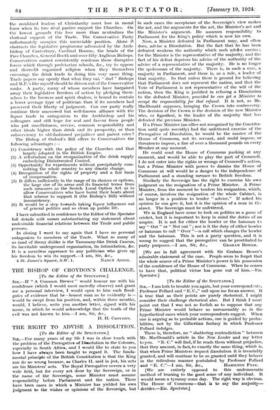THE RIGHT TO ADVISE A DISSOLUTION.
[To the Editor of the SPECTATOR.] 51.11,-7-For many years of my life I was in close touch with the problem of the Prerogative of Dissolution in the Colonies, especially in South Africa, and I would like to state to you how I have shiays been taught to regard it. The funda- mental principle of the British Constitution is that the King can do no wrong because, as Charles H. said in jest, his acts are his Ministers' acts. The Royal Prerogative covers a very wide field, but for every act done by the Sovereign, or in the name of the Sovereign, some Minister must assume responsibility before Parliament and the nation. There have been cases in which a Minister has yielded his own judgment to the wishes or opinions of the Sovereign, but
in such cases the acceptance of the Sovereign's view makes the act, and the arguments for the act, the Minister's act and the Minister's argument. He assumes responsibility to Parliament for the King's policy which is now his own.
Now, a Minister defeated in Parliament may, and often does, advise a Dissolution. But the fact that he has been defeated weakens the authority which such advice carries ; for the Minister is the representative of the majority, and the fact of his defeat deprives his advice of the authority of the advice of a representative of the majority. He is no longer the spokesman of the majority. There is, in such a case, a majority in Parliament, and there is, as a rule, a leader of that majority. So that unless there is ground for believing that Parliament does not represent the nation, and that the Vote of Parliament is not representative of the will of the nation, then the King is justified in refusing a Dissolution to the defeated Minister, proeided he can get a Minister to accept the responsibility for that refusal. It is not, as Mr. MacDonald supposes, bringing the Crown into controversy. The decision of the Crown is the decision of the new Minister who, ex hypothesi, is the leader of the majority that has defeated the previous Minister.
If a Prime Minister (an office not recognised by the Constitu- tion until quite recently) had the unfettered exercise of the Prerogative of Dissolution, he would be the master of the House of Commons, not its servant, and could impose, or threaten to impose, a fine of over a thousand pounds on every Member at any moment.
He could send the House of Commons packing at any moment, and would be able to play the part of Cromwell. I do not enter into the rights or wrongs of Cromwell's action, but a Prime Minister with power to dismiss the House of Conunons at will would be a danger to the independence of Parliament and a standing menace to British freedom.
Similarly the Sovereign has the right to exercise his own judgment on the resignation of a Prime Minister. A Prime Minister, from the moment he tenders his resignation, which, of course, involves the resignation of the whole Cabinet, is no longer in a position to tender " advice." If asked his opinion he can give it, but it is the opinion of a man in the street. The Sovereign must be unfettered.
We in England have come to look on politics as a game of cricket, but it is important to keep in mind the duties of an umpire. It is not for either the bowler or the batsman to say " Out " or " Not out "; nor is it the duty of either bowler or batsman to call " Over "—a call which changes the bowler and the batsman. This is not a party question, and it is wrong to suggest that the prerogative can be prostituted to
party purposes.—I am, Sir, &c., GRAHAM BOWER.
[We are in full agreement with Sir Graham Bower's admirable statement of the case. People seem to forget that the whole source of a Prime Minister's power is his possession of the confidence of the House of Commons. When he ceases to have that, political virtue has gone out of him.—En. Spectator.]










































 Previous page
Previous page